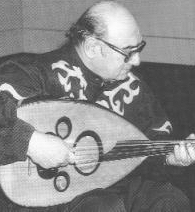Munir Bashir منير بشيرܡܘܢܝܪ ܒܫܝܪ | |
|---|---|
 | |
| Background information | |
| Born | 1930[1] |
| Origin | Mosul, Iraq |
| Died | September 1997 (aged 66–67) Budapest, Hungary |
| Genres | Middle Eastern music |
| Occupation | Musician |
| Instrument(s) | lute, oud |
| Years active | 1953–97 |
Munir Bashir (Arabic: منير بشير; Syriac: ܡܘܢܝܪ ܒܫܝܪ; 1930 – September 28, 1997) was an Iraqi-Assyrian oudist. Bashir is considered one of the foremost virtuosos of the Arabic oud, and is widely renowned as one of the most important figures in 20th century Middle Eastern music.
Bashir is widely regarded both for his extensive mastery of the Arabic modal system of maqam and his virtuosity in the improvisational tradition of Arabic taqsim.[2] He is credited as being the first major figure to elevate the Arabic oud to the realm of solo concert performance, and was among the first Middle Eastern instrumentalists to gain recognition in the United States and Europe. His music is characterized by a unique style of improvisation that sometimes saw his native traditional Arabic music fused with Indian and European musical influences.[3] Bashir also pioneered many techniques on the oud which have since become standard practice.
Bashir is the father of oudist Omar Bashir, who later received acclaim as a master oudist in his own right, and with whom he recorded several albums. He is also the brother of oudist Jamil Bashir. Although Bashir was born in Iraq, the tumultuous political landscape of violent coups and wars during his lifetime eventually led to his seeking refuge in Europe. He first gained prominence in Hungary, where he would maintain a permanent residence throughout most of his adult years.
- ^ Colors of Enchantment: Theater, Music and the Visual Arts of the Middle East By SHERIFA ZUHUR, ED.- Page 312
- ^ World Music: The Rough Guide, by Simon Broughton, Mark Ellingham, Richard Trillo, 1999.
- ^ Colors of Enchantment: Theater, Music and the Visual Arts of the Middle East, by Sherifa Zuhur, 2001